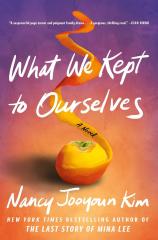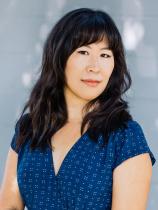What We Kept to Ourselves
Review
What We Kept to Ourselves
Nancy Jooyoun Kim, the New York Times bestselling author of the Reese’s Book Club pick THE LAST STORY OF MINA LEE, is back with her second novel, WHAT WE KEPT TO OURSELVES. This time, she has written the propulsive and moving story of a family torn asunder by their mother’s disappearance, and the shocking arrival of a figure from her past that puts them in the crosshairs of corruption.
Sixty-one-year-old John Kim is concerned about his children: college graduate Ana and high school senior Ronald. He worries about their internet usage, their laziness and the approaching new year, which has brought with it the Y2K scare that threatens to wipe him and his family off the planet along with everyone else in an apocalyptic nightmare. Maybe, he muses, an apocalypse would be better than what they have now.
As an immigrant, John works tirelessly for very little, and his children, sheltered from the realities of what he faced in war-torn Korea, don’t know how to be grateful for his sacrifices. On top of that, the one-year anniversary of his wife’s disappearance, practically from thin air, is rapidly approaching, and the family still has no idea where Sunny Kim has gone. So absorbed is John in these thoughts that he nearly misses the feet sticking out from under the loquat tree in his backyard. Someone has died on John’s property, and in the man’s hand is an envelope bearing his wife’s name.
"An epic, sweeping portrait of a family, WHAT WE KEPT TO OURSELVES explores not just the mystery of Sunny Kim, but also the American dream, the power of art, the trappings of motherhood, and the consequences of secrets that live between family members."
When the police arrive, they are quick to write this off as someone who panicked at the sound of John’s steps and fell from the fence he was illegally climbing. It helps, of course, that the man was Black and homeless. Even John, an outsider himself, is quick to agree with them. After all, he knows the cost of stepping out of line, especially if you already have reason to draw attention; as a “good immigrant,” he believes in the notion that America is a meritocracy.
However, John does not reveal the envelope to the police or to his children. When he rips it up and discards it that night, he believes that he will be able to leave the man's death, and whatever its connection was to his wife, in the past. But his sharp-eyed daughter spots the shreds and puts them back together, discovering a message: “Dear Sun…. You have saved me more than once and you don’t even know it…. I hope one day we’ll meet again. I have so much to tell you. –RJ” This man knew their mother, Ana realizes, and his appearance and death so close to the anniversary of her disappearance cannot be a coincidence.
Alternating between Los Angeles in 1999 and 1977, Nancy Jooyoun Kim chronicles the life of the Kim family, starting with artist Sunny’s arrival in the United States as the bride of an aloof husband. The Sunny we meet is an ambitious dreamer, a passionate woman who longs for connection. But rather than opportunity and potential, in America she finds only alienation and isolation. Her inability to learn the language stifles her; her husband’s devotion to becoming as American as possible blindsides her; and though she loves her children endlessly, motherhood drains her.
In 1999, Sunny’s family, left only with their memories of her, recall a woman who fed them beloved Korean dishes, kept a clean home and understood each of them intrinsically without ever asking for that same understanding herself. Sunny was not the kind of woman to abandon her family, so they have all more or less agreed to believe that foul play was involved. But the arrival of RJ, his letter and the secret of his shared history with their mother blow their delusion away, leaving nothing but fear and speculation in its wake.
As the family starts to independently investigate RJ and his suspicious death, they also must look at their own memories and the things they have repressed, obfuscated and otherwise hidden from one another. When Ana remembers that she recognizes RJ from a day trip to the Griffith Observatory when she was a child, she realizes that the transformation from the kind, warm, clean man who doted on her and her mother to the disheveled, unhoused body in her backyard was not a natural one.
The arrival of RJ’s daughter, equally desperate to learn what happened to her father, ignites a family-wide investigation. It also catches the attention of a group of men who would prefer that RJ stay dead and buried, putting the Kim family in the crosshairs of a decades-long scandal more dangerous than they know. All the while, the mystery of their mother --- her disappearance, but also the life she lived in secret when she was still there --- looms over them, propelling the narrative toward an explosive, shocking end.
An epic, sweeping portrait of a family, WHAT WE KEPT TO OURSELVES explores not just the mystery of Sunny Kim, but also the American dream, the power of art, the trappings of motherhood, and the consequences of secrets that live between family members. Kim’s sophomore release is a powerful examination of how our histories --- and our ability to reckon with them --- live not only in the past or in our memories, but also in the other humans who bear witness to them, who serve as a living record. And since most people can never be fully honest with everyone around them, the novel harks back to its title by revealing the damages (and the glory) of what we keep to ourselves.
While the novel is ostensibly about Sunny Kim, John is a riveting, compelling touchstone as he grapples with his fears about his wife’s fate and is drawn back into his own trauma of leaving his beloved home, only to arrive in a country that doesn’t want him. The obvious connection is that John’s feelings of alienation and grief remind him of Korea, but the opposite is true as well: everyday feelings of grief and tragedy can often feel like a battlefield. And while one --- the literal battlefield --- is obviously more traumatic and transformative, Kim pays no less attention (and grants no less weight) to the metaphorical, emotional war ground. It is with this awareness that she makes clear the stark truth of the book: whether a war is between countries, citizens or loved ones, you can always become a casualty.
Kim tackles an impressive, if daunting (and occasionally unwieldy), laundry list of themes and moral queries here. This could be a solely depressing, mysterious novel but for the beating heart at its center: the rare, extraordinary friendship between two “others” living outside of the American experience, and the extraordinary nature of their relationship, which transcends the binds of language. Kim astutely notes that in the face of great and terrible cruelties, humans are quick to build a fence between “us” and “them,” but that this fence only severs us from the expansiveness of our humanity. WHAT WE KEPT TO OURSELVES is a remedy, a salve to this truth. Rather than cleaving us from ourselves, it zeroes in on the tender but unbreakable ties that hold humanity together.
Reviewed by Rebecca Munro on October 28, 2023
What We Kept to Ourselves
- Publication Date: October 10, 2023
- Genres: Domestic Thriller, Fiction, Mystery, Suspense, Thriller
- Hardcover: 416 pages
- Publisher: Atria Books
- ISBN-10: 1668004828
- ISBN-13: 9781668004821




